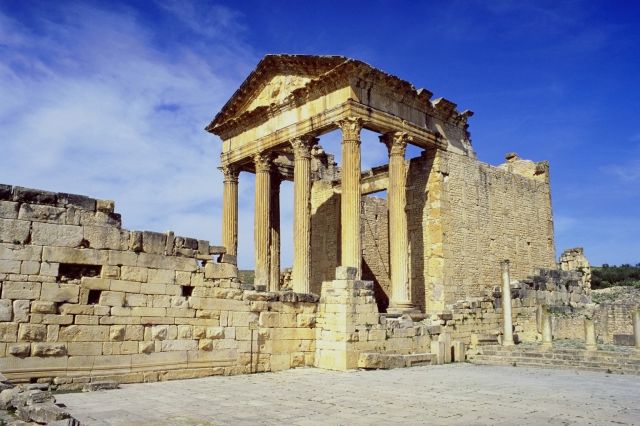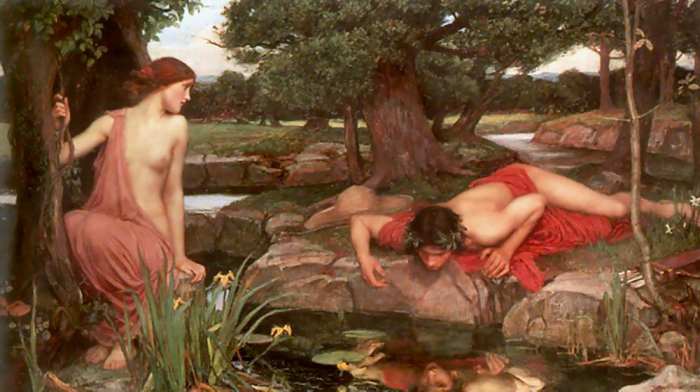Cultural Artifacts from Greece
 What is a cultural artifact, anyway??
What is a cultural artifact, anyway??
A cultural artifact is a story, fact, or work of art that is about or from the past. Still don't get it? Well, the painting of "Washington Crossing the Delaware" is an example of a cultural artifact about the 1770s. However, we want to go much farther back in time than that, to Ancient Greece, in fact. So a drawing like this one of the Greek god Zeus is one type of artifact that we want to use.

Remember, an artifact doesn't have to be made in the time period, it just has to be made about the time period. And it doesn't have to be art, either. Artifacts are also facts and stories.
Artifacts
Word Origins
Echo

Echo was a beautiful nymph who loved to frolic in the countryside. She was a friend of the goddess Diana, and often accompanied her. But Echo had a major flaw: she loved to talk and argue, and she always had to have the last word. On one occasion, the goddess Juno was searching for her husband, who she suspected was cavorting with the nymphs. Echo, to protect her playfellows, kept Juno from finding her husband by her talk until the nymphs could get away. When Juno found out, she was very angry, and said: "You shall forfeit the use of that tongue with which you have cheated me, except for that one purpose you are so fond of- reply. You shall still have the last word, but no power to speak first."
Later, Echo saw a handsome man walking through the hills. She followed him, wishing to speak with him and seduce him. But she could not, because of the curse Juno had put on her. She waited for him to speak, so she might answer. He, finding himself separated from his friends, called out, "Who's here?" Echo, happy that she could finally speak, shouted, "Here!" Narcissus could not see her, so he said, "Come." Echo echoed him (hee hee). No one came, and Narcissus asked, "Why do you shun me?" Echo answered in the same words. "Let us join one another," called Narcissus. The nymph, overjoyed at hearing innuendo, ran to him and embraced him. He was startled, and exclaimed, "Hands off! I would rather die than you should have me!" "Have me," she begged, but he would not. He left her, and she ran to hide her embarrassment in the forest. Since then, she has lived in caves and rocky places. She wasted away with unreturned love, til she was almost nothing, yet she could not die, as much as she wanted to. After a while there was nothing left of her but her voice. She still replies to anyone who calls out to her, and still she always has the last word.
(story (rewritten) from Bulfinch's Fables)
Narcissus

Narcissus was mean to all the nymphs and discouraged their advances. Once a maid who had been shunned by him asked a goddess that he might one day get a taste of his own medicine. The goddess granted her request.
There was a beautiful spring in the country that was never disturbed by man, or beast, and never dirtied with twigs or fallen leaves. One day, Narcissus came to this fountain, thirsty and hot from hunting. As he knelt down to drink, he saw his reflection in the water. He thought it was some beautiful spirit living there and looked on himself for a time in awe. He then fell in love with himself. He tried to kiss it, to embrace it but, it, being only a reflection, disappeared the moment the water was touched, and then returned when it became still. He could not get up from the grass; he had no thoughts of food, drink, or sleep. He longed to touch it and speak to it, but it only mimicked him and teased him. He was tortured by the unreturned love he felt, as Echo watched from a distance. She answered him when he cried, "Alas!" and watched him pine away and lose his vigor and health. He died; and when his spirit passed the river Styx, it leaned over the boat to look at itself in the water. The nymphs mourned for him, and when they wailed so did Echo. They would have burned his body, but could not find it; a flower grew up on the bank of the spring. It is a beautiful flower, as he was, and the nymphs named it Narcissus in memory of the handsome lad. (also from Bulfinch's Fables (rewritten))

Months
January
January was named after the ancient sky god, Janus, who was said to have created the world. January and February were added after the rest of the months were named.
February
Some say February (originally Februarius) got its name from a goatskin thong called a februa. During a festival in this month, a februa was wielded by priests who used it to beat women in the belief that it would make a barren woman fertile.
Apparently February, when adopted, had but 23 days—traditionally the 23rd day of that month was the end of the calendar year. Cool! February is also important because *someone special* was born on the 9th... :)
March
March (Martius), originally the first month, was named after Mars, the Roman god of war. Six of the other original ten were simply numbered as Quintilis thru Decembris (fifth thru tenth, but only September, October, November and December have kept them) but there were already disagreements when Ovid wrote, two thousand years ago, as to the sources of names for what were originally the second thru fourth, Aprilis, Maius and Junius. These disagreements continue to the present time.
April
April (Aprilis), also a subject of controversy, was sacred to Venus, and her festival–the Festum Veneris and Fortuna Virilis–occurred on the first day of this month. Supposedly Aprilis stems from aphrilis, corrupted from Aphrodite. Jakob Grimm, a later authority, opposed this stating it may have originated from the name of a god or hero named Aper or Aprus.
May
May (Maius) was said by some to be named after the goddess Maia, a daughter of Atlas. But others disagree and say that May and June refer to old and young men. We may never know... :)
June
June (Junius) may be indirectly named after the goddess Juno.
July
At least we know the origin of July. It was named to honor Julius Caesar.
August
August was named after the second Caesar, Caesar Augustus.
September
September (Septembris) was originally the seventh month of the year. The prefix sept- comes from the Latin word septem, meaning... seven!! I'll bet you didn't guess that one!
October
October (Octobris) was originally the eighth month of the year. The prefix octo- comes from the Latin word (this one's harder) octo, meaning... eight. duh.
November
November (Novembris... noticed how these names are just the month with no e's in the suffix and an -is at the end... very predictable) was originally the... (let's hear you say it) ninth month of the year. Very good! The prefix novem- comes from the Latin word novem, meaning... (it's ok if you don't know, just guess)...NINE!
December
Is this getting boring for you? But who's the one typing it and trying to make it interesting... I think she's got a harder job than you :). Anyway, December, originally Decembris, of course, was the tenth month, as you can see from the prefix decem-, which comes from the Latin word decem, meaning ten!! Ok, all done! *"Waiter, check please!"*
From the Early Roman Calendars site.
The Olympics
The Olympics are a very important tradition we have inherited from Ancient Greece. They began as religious ceremonies. Women were not allowed to compete or even watch because the men practiced and contended naked! *EEEWWWWW* :)
Games played at the Olympics
Pentathlon
This was a 5-event combination of discus, javelin, jumping, running and wrestling.
Discus
The ancient Greeks considered the rhythm and precision of an athlete throwing the discus as important as his strength.
The discus was made of stone, iron, bronze, or lead, and was shaped like a flying saucer. Sizes varied, since the boys' division was not expected to throw the same weight as the mens'.
Javelin
The javelin was a man-high length of wood, with either a sharpened end or an attached metal point. It had a thong for a hurler's fingers attached to its center of gravity, which increased the precision and distance of a javelin's flight.
Jump
Athletes used lead or stone jump weights (halteres) shaped like telephone receivers to increase the length of their jump. The halteres were held in front of the athlete during his ascent, and forcibly thrust behind his back and dropped during his descent to help propel his body further.
Jump weights also doubled as weight lifting equipment during training.
Running
There were 4 types of races at Olympia. The stadion was the oldest event of the Games. Runners sprinted for 1 stade (192 m.), or the length of the stadium. The other races were a 2-stade race (384 m.), and a long-distance run which ranged from 7 to 24 stades (1,344 m. to 4,608 m.).
And not only did they do all these running events, the Greeks had a particularly grueling event. It was a 384 m. to 768 m. race by athletes in armor. This race helped to build the speed and stamina that Greek soldiers needed in battle. The usual armor consisted of a helmet, shield, and greaves and weighed about 50-60 lbs! Whew!!
Wrestling
This event was pretty similar to the modern sport. An athlete needed to wrestle his opponent to the ground, landing on a hip, shoulder, or back for a fair fall. Three "throws" were needed to win a match. Biting and genital holds were illegal (EEOUCH and YUCK!!). Breaking your opponent's fingers (AAAAHHH!) and other nasty cheats were allowed.
From Crane, Gregory R. (ed.) The Perseus Project, http://www.perseus.tufts.edu, December, 2002.
LINKIES!!
MY HOMIE!!
The Other Greek Project




